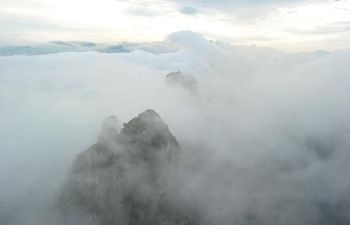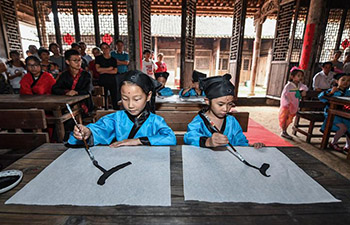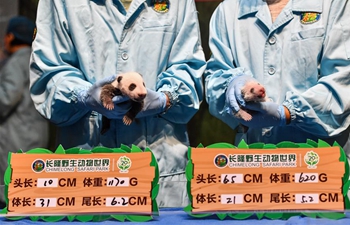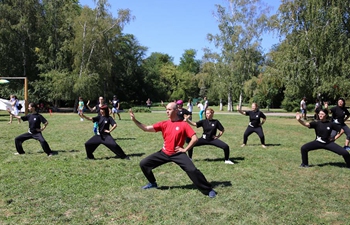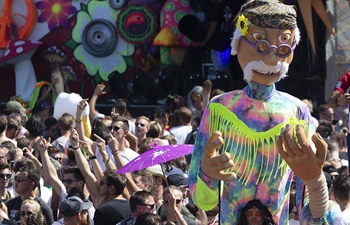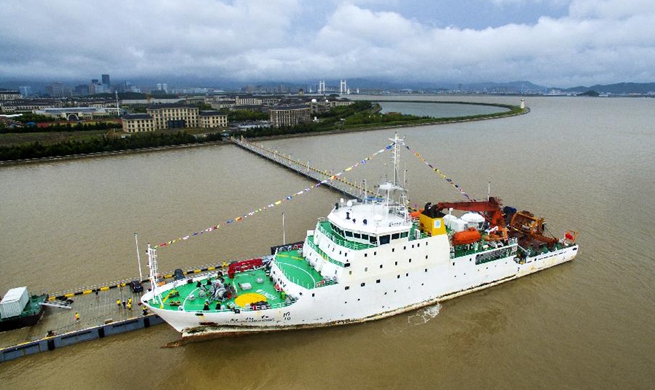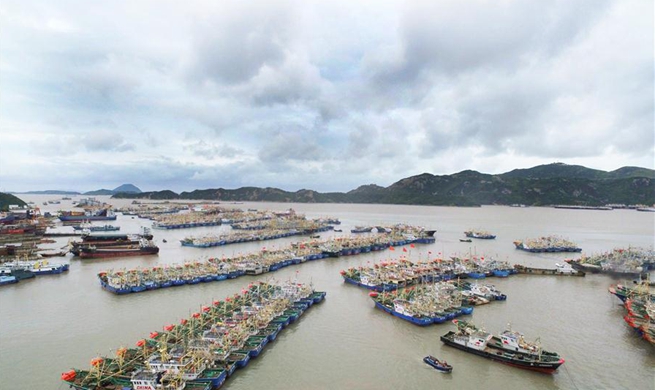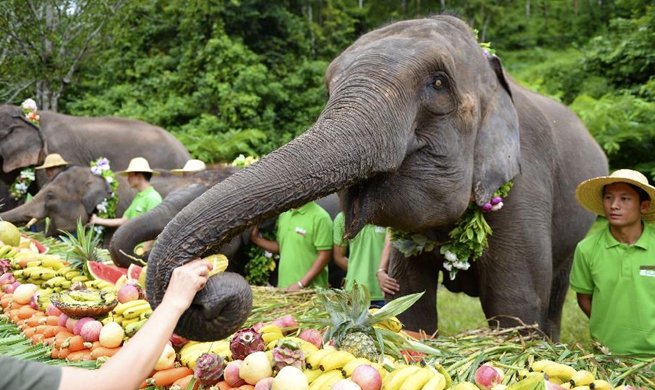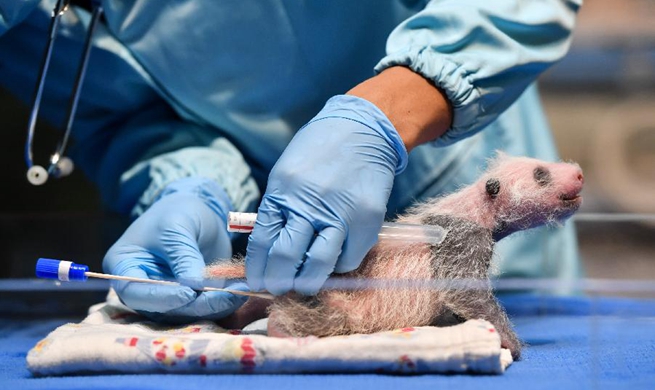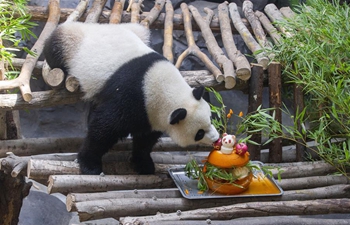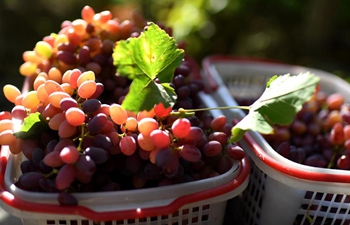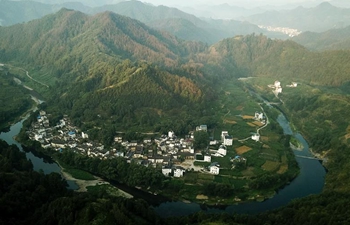By Xinhua sportswriters Xiao Shiyao, Wang Meng and Ding Wenxian
BEIJING, Aug. 12 (Xinhua) -- Dazzling fireworks painted the night sky with bright colors. Golden giant footprints traversed along the axis of Beijing from Tian'anmen Square to the "Bird's Nest", unveiling the hour-long show that presented a new China to the world. It's been ten years since China astounded the world with a magnificent opening ceremony and an "exceptional" Olympic Games. The legacy of the 2008 Olympics has been imperceptibly influencing the city as well as the country.
From the "Bird"s Nest" to the "Ice Ribbon"
After the splendid fireworks shone through the night over the "Bird's Nest", Li Jiulin finally breathed a sigh of relief. Since he was appointed as chief engineer of the construction of the Beijing National Stadium at the age of 35 in 2003, Li devoted all of himself to this "mission impossible" and barely had time to relax.
"At that time, no one had the experience in China to deal with such complicated structural steel construction; none of the foreign experts believed that we could finish the job by ourselves," Li says.
To solve the endless problems, Li Jiulin and his colleagues completed 13,520 construction drawings on the basis of 150 designs.
"From September 2003 to August 2008, I almost worked every day from dawn until dark; sometimes I only went home once a month, although it was not far," Li says.
The arduous efforts of Li Jiulin and his team eventually paid off. The stadium girdled with stripes of concrete not only became the flagship venue of the 2008 Beijing Olympic Games but continues to wield its profound influence after the conclusion of the Olympics.
During the ten years since the "Bird's Nest" opened to public in October 2008, this new landmark in China's capital has received more than 35 million visitors from across the world and held about 600 different events including international football matches, concerts and the 2015 Beijing IAAF World Athletics Championships.
The iconic stadium has realized sustainable development goals with an annual operating income of over 250 million yuan (about 36.7 million US dollars), said Xiang Jun, the General Manager of National Stadium Co., Ltd.
Li Jiulin now embarks on a new challenge - being the chief engineer of the National Speed Skating Oval "The Ice Ribbon", the main venue for the 2022 Beijing Winter Olympic Games. The 50-year-old told Xinhua that he is much more confident than a decade ago because of the experience and technologies he has accumulated from the "Bird's Nest" project.
"The building of Beijing National Stadium launched a new era in China's construction industry and has drawn a variety of innovations, many of which have been upgraded in the following years and will be applied to the National Speed Skating Oval," says Li.
It is worth mentioning that the "Ice Ribbon", which earns its name courtesy of its distinctive and poetic facade, is the only permanent new ice-sports venue for the 2022 Winter Olympics in Beijing.
The city will make use of the existing venues from 2008 when it hosted the Summer Olympics. With the "Water Cube" set to stage the curling events, the National Indoor Stadium is to be used for ice hockey, and Li Jiulin's "Bird's Nest" is planned to once again host the opening and closing ceremonies. The legacy of the 2008 Olympics will significantly cut the cost of hosting the 2022 Winter Olympic Games.
"The 'Bird's Nest' and the 'Ice Ribbon' are the symbols for 2008 and 2022 Olympics respectively. It's a great honor for me as an architect," Li Jiulin said, with a huge grin on his face. "More importantly; the ultimate vision of architecture is to create better life for people."
From the Fire of Steelmaking to the ice in Skating Rink
In the summer of 2008, Li Jiulin was right at the peak of his career, while the 31-year-old Shougang worker Liu Boqiang fell into a trough.
As part of the city's efforts to improve the air quality, the steel conglomerate, which was founded in 1919, halted its production in Shijingshan District, Beijing in 2005 and relocated its production base to Caofeidian, Hebei.
The relocation was completed at the end of 2010, and more than 60,000 workers including Liu Boqiang have been resettled. Liu was laid off. "I was really nervous at that time. I couldn't tell where I and Shougang should go in the future," Liu said.
However, in retrospect, he admits that this change was a significant opportunity for Shougang as well as for him. After the ten years of transition since 2008, Shougang, one of China's largest state-owned enterprises, has entered a new stage of development, producing high-end plates with high technology, high added value and high social demand.
Nearly 100% of the waste gas, waste materials and wastewater are recycled.
What really surprises the public is the rejuvenation of its old industrial relics, which has now proceeded to a brand-new era at the "New Shougang High-end Industry Comprehensive Service Park." In the park, the old plant, blast furnace and other industrial buildings have been transformed into sports and leisure facilities and a museum.
The silo that used to store ironmaking raw materials has become the office area for the Beijing Winter Olympics Organizing Committee. The clean coal workshop has been transformed into an Ice Sports Training Base for the national teams. The cooling tower will be built into the Snowboard Big Air venue for Beijing 2022 Winter Olympics.
International Olympic Committee president Thomas Bach spoke highly of the protection and utilization of the old industrial site. "Chinese friends are not only talking the talk, but also walking the walk. They take sustainability really as a core issue for the organization of the Games," Bach said.
Just like the old factory, Liu also achieved a great transition - he became an ice-maker at the Shougang Ice Sports Training Base skating rink. Coming into a completely strange field, he had to learn from scratch. Every day he is busy on the ice rink, wearing knee pads and cotton clothes, to serve the national speed skating team and figure skating team.
"The first time I saw Sui Wenjing and Han Cong (world champions of pair skating) performing, I felt so amazed. It was extraordinarily beautiful!" he said. From a spectator in 2008 to a participant for 2022, Liu described it as "beyond [his] imagination".
From First Attempt to Life-long Pursuit
Liu Boqiang is not the only one that devoted himself to the 2022 Olympic Games. A "slash" granny, Cai Xiulan, an 82-year-old demobilized soldier, is now dedicating herself to her 17th year as a volunteer.
It all began in 2001, when the entire country was immersed in ecstasy as Beijing was awarded the 2008 Summer Olympics. Besides joy and pride, Cai also felt a sense of responsibility. "The Olympic Games is the business of China, of Beijing, and therefore, of me," Cai said.
As a local that majored in English in university, Cai made up her mind to teach her fellow comrades basic English so that they could help when foreigners flooded to Beijing for the sports extravaganza. And she did it for four years, unremittingly tutoring 40 soldiers in their spare time.
In 2005, Cai was enrolled as a registered volunteer for the Beijing Olympic Games and taught residents English in communities for the following two years. She could be seen here and there, before and during the Olympics, wherever and whenever she was needed. Now she has spent a total of 28,000 hours volunteering.
"The 2008 Olympics offered me an opportunity to find my best place in the society, to unleash my potential and to pursue the true value of life," the granny said. "From then on, volunteer services have become an indispensable part of my life, my second career."
In fact, 2008 was regarded as the genesis of volunteerism in China. An average of 1.7 million volunteers contributed their efforts to the success of the Beijing Olympic Games. From then on, volunteerism began to flourish in China, not only during big events, but in daily life.
Within ten years, the Chinese government has formulated regulations to establish a system to manage volunteer activities and to protect the interests of volunteers within a legal framework.
There are over 93.6 million registered volunteers on Chinavolunteer.cn nationwide, providing nearly 1 billion hours of volunteer services for over 1.4 million projects.
Four years ahead of the 2022 Winter Olympics, over four million registered volunteers in Beijing are ready to become part of the Games with probably more to come when public volunteer recruitment starts at the end of 2019.
The grand meeting of the 2008 Games changed the lives of Li Jiulin, Liu Boqiang, Cai Xiulan and thousands of Chinese people. In four years, the city will host another global showpiece. Li Jiulin, Liu Boqiang and Cai Xiulan are ready, Chinese people are ready, and Beijing is ready.




